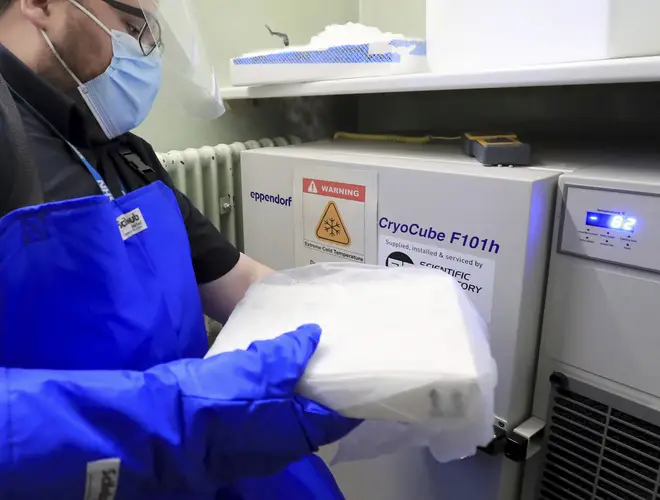
Nick Abbot 10pm - 12am
7 December 2020, 05:22 | Updated: 7 December 2020, 07:44

Covid-19 vaccine arrives at NHS hospitals in England
The head of the UK's medicines regulator has said there "should be no doubt" about the safety of the Covid-19 vaccine which will be rolled out this week in the largest scale immunisation programme in the UK's history.
Dr June Raine, chief executive of the Medicines and Healthcare products Regulatory Agency (MHRA), which approved the Pfizer/BioNTech jab, said there should be "real confidence" in the rigour of their approval.
Vaccinations will be administered at dozens of hospital hubs from Tuesday - with people aged 80 and over, care home workers and NHS workers who are at higher risk the first to receive the jab.
Read more: NHS preparing for 'largest scale vaccination campaign' in UK history
Read more: UK records another 231 Covid-19 deaths and 17,272 cases
Doses have been arriving at hubs in preparation for Tuesday - reportedly dubbed "V-Day" by Health Secretary Matt Hancock.
Pictures show the arrival of a batch of vaccines at Croydon University Hospital in south London over the weekend, with similar scenes unfolding all around the country.

On arrival in Croydon, the batch of vaccines was unboxed by a pharmacy technician wearing specific protective equipment to ensure he is able to safely handle the delivery at such cold temperatures.
After going through final quality control checks the batch is placed in a freezer to ensure it can be kept at the right temperature until it is ready to be used.
The vaccine is being stored in specially installed coolers, designed to hold the vaccine at the required minus 70C.
The distribution of the vaccine across the UK is being undertaken by Public Health England and the NHS in England, Scotland, Wales and Northern Ireland through systems specially adapted from those used for the national immunisation programmes.
NHS England said staff were working through the weekend to prepare for the launch.
There are 50 hubs in the first wave of the vaccination programme in England, with more hospitals starting to vaccinate over the coming weeks and months as the programme ramps up.

BMA chair reveals vaccine can be provided by late next week
It is not known when exactly all 50 hubs will receive vaccine doses, as they are starting to administer the jab at different times, but deliveries are expected to happen throughout the week.
Asked about how important the public health message is to make sure that people actually take the vaccine, Dr Raine said: "It's vitally important.
"And I would really like to emphasise that the highest standards of scrutiny, of safety and of effectiveness and quality have been met, international standards.
"And so there should be real confidence in the rigour of our approval.
"More than that, our Commission on Human Medicines has scrutinised every piece of data too, so there should be no doubt whatever that this is a very safe and highly effective vaccine.
"It will help us turn the corner. There's really not one of us who hasn't been affected by this pandemic, and our organisation, like every other, has been completely focused on doing our job to be able to help defeat this terrible disease."

Professor Medley warns of January spike in deaths
Dr Raine was asked how she had coped with becoming a "global figure" and about reports that the Queen, 94, will have the Pfizer injection within weeks.
She said: "I'm proud, I'm honoured. I think that news that you've just given us is humbling, and it's everything that we're here to do at the MHRA.
"We're a public health organisation, we work as full partners, if I can say, in the public health family, and our goal is totally to protect every member of the population, Her Majesty of course, as well."
When asked about reports that the Queen and Duke of Edinburgh, 99, would have the jab within weeks and share the news, a Buckingham Palace spokesman said: "Medical decisions are personal and this is not something we will comment on."
Meanwhile, there is still no guaranteed date for when care home residents will be vaccinated despite them being at the top of the priority list, with Mr Hancock saying there are "significant challenges" to overcome.
Logistical issues mean there are difficulties in getting the jab to residents, as the Pfizer/BioNTech vaccine needs to be stored at minus 70C before being thawed out and can only be moved four times within that cold chain before being used.
The vaccine boxes containing 975 doses will need to be split so that they can be taken to care homes.
Dr Raine said: "We have approved how the vaccine can be put into the small packs, but obviously what we're doing is giving advice and guidance on how well that, carefully, that is done.
"Our goal is to ensure that the vaccine reaches people in care homes, the residents there, as safely as possible."
Asked when people will get the vaccine, she replied: "As I say we're working very hard to make sure that this is done as quickly as possible."
Asked about the impact of Brexit on the rollout of the vaccines, Dr Raine added they are "fully prepared for any possible outcome".
Environment Secretary George Eustice said there will be no disruption to the vaccine, saying: "We have got many contingency plans in place and there won't be any effect on the deployment of this vaccine from a no-deal Brexit."